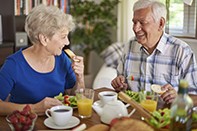Peer Reviewed
Feature Article Nutrition
Promoting healthy and enjoyable eating in the elderly
Abstract
Increasing numbers of older people are living in the community and the enjoyment of eating can fade with increasing age, leading to nutrient deficiencies that contribute to premature death, disease and disability. Several strategies can reduce the risk of inadequate food intake to improve health and the enjoyment of food for older people living in the community.
Key Points
- Enjoyment in eating and the social interactions associated with eating are fundamental to maintaining adequate nutrition.
- There is no need for older people to follow a restrictive diet because ageing is associated with a higher risk of under-nutrition.
- Although food intake decreases with increasing age, older people actually need more nutrients as they age with increased requirements for protein, calcium, vitamin D, vitamin B6 and riboflavin.
- Vitamin and mineral supplements, particularly of calcium and vitamin D, may be required for some older people.
- Maintaining muscle strength is needed to keep function and independence: adequate protein intake in combination with progressive resistance training is required to minimise the age-related loss of lean body mass.
- It is okay for older people to be overweight, as those with a body mass index (BMI) of about 27 kg/m2 experience the lowest rate of mortality. The optimal BMI range for people over the age of 65 years is between 23 and 30 kg/m2 .
- Unintentional weight loss in older people is not normal and needs to be addressed promptly.
- Nutrition risk screening using a validated tool such as the Mini Nutritional Assessment (MNA) should be performed routinely and can be incorporated into annual health checks for those aged 75 years and older.
Picture credit: © gpointstudio/iStockphoto. Models used for illustrative purposes only.
Purchase the PDF version of this article
Already a subscriber? Login here.

